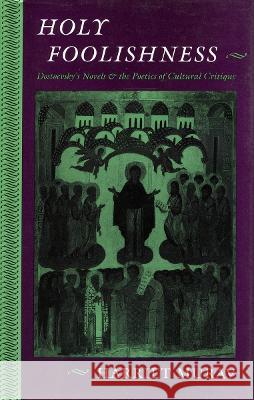Holy Foolishness: Dostoevskyas Novels and the Poetics of Cultural Critique » książka
Holy Foolishness: Dostoevskyas Novels and the Poetics of Cultural Critique
ISBN-13: 9780804720595 / Angielski / Twarda / 1993 / 228 str.
Holy Foolishness: Dostoevskyas Novels and the Poetics of Cultural Critique
ISBN-13: 9780804720595 / Angielski / Twarda / 1993 / 228 str.
(netto: 310,61 VAT: 5%)
Najniższa cena z 30 dni: 308,98
ok. 30 dni roboczych
Bez gwarancji dostawy przed świętami
Darmowa dostawa!
This work examines the ways in which Dostoevsky's adoption and reinvention of the medieval Russian holy fool in Russian Orthodoxy, a person who feigned madness or folly as an ascetic feat of self-humiliation, serves as a locus for a critique of his culture's increasing reliance on the scientic paradigms of Claude Bernard's physiology, and as a source of formal narrative innovation in his novels. The author first explores the paradoxical hagiography of the holy fool, whose saintly acts are disguised under the mask of demonic folly. She then traces the rise of medical science in the 19th century and the increasing authority of the new scientic models of human behaviour, especially the all-important notion of the normal and the pathological. In its theoretical orientation, the book both builds from and criticizes Bakhtin's work on carnival.











